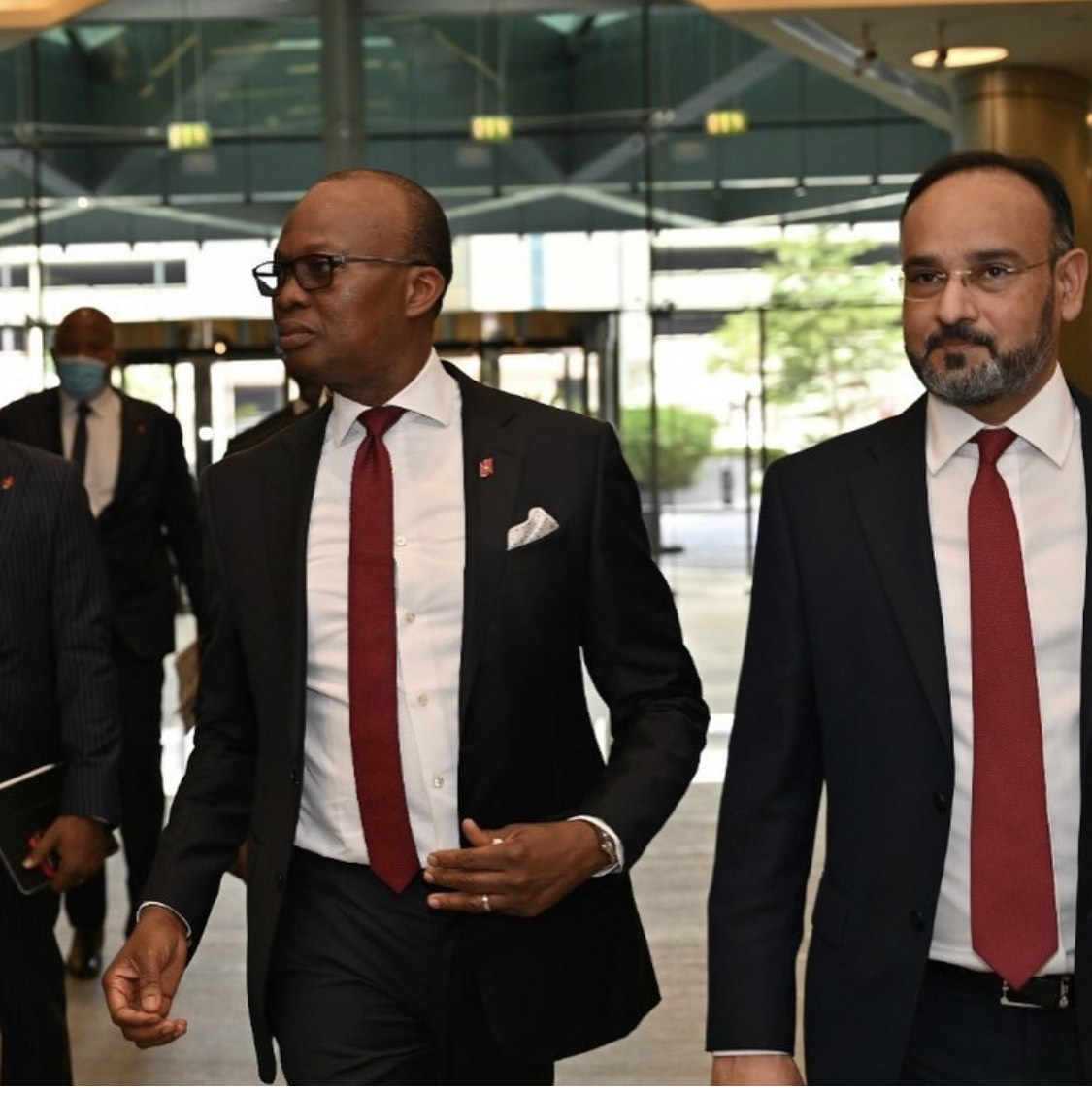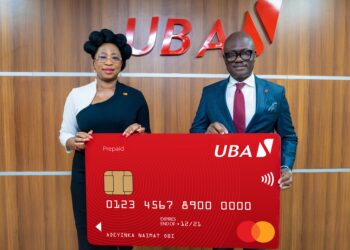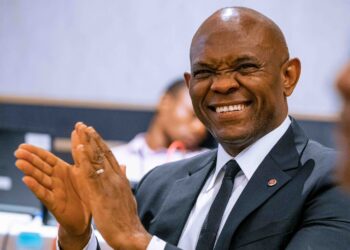I’m seated at a dinner in faraway Dubai pondering as the Chairman of United Bank for Africa gave the opening remark for the launch of UBA Dubai.
It’s a landmark event as it positions UBA as one of the leading Nigerian and indeed African banks when it comes to having a global footprint.
Regional and global trade will surely dominate how businesses are conducted in the next few years and it’s not difficult to see what UBA is trying to achieve here.
The bank has over 20 branches/subsidiaries outside Nigeria and is the only Nigerian bank with a deposit license in the United States.

As I ponder, my thoughts gravitate to what this latest move could mean for the bank’s shareholders. Why Dubai, I thought? I decided to ask GMD/CEO, Kennedy Uzoka why the bank was making this bold move in the Middle East.
There he was seated two tables away browsing on his phone as an entertainer serenaded guests with soothing jazz music.
As soon as we were done with the pleasantries, I quickly asked him why UBA was expanding into Dubai and what the actual play was. The questions sounded rhetorical, but Uzoka knew where I was getting at.
“Ugo, it’s a global trade for us. UBA is thinking about the future and believes having a hub in the heart of the Middle East was key to connecting businesses and trade from the US, Europe, Asia, and Africa. Every business needs a financial institution to serve as the connection between importers and exporters and we want UBA to be the bank of choice for trade with Africans.”
UBA currently has an outlet in the US, UK, France and so adding Dubai to the mix was a logical next step for the bank which styles itself as not just a Nigerian-owned bank but a pan-African bank.
“With this new hub, we can facilitate trade for customers looking to trade across continents offering a seamless interconnectivity that is very valuable for doing business,” Mr. Uzoka explained.
This has been UBA’s play for years, and they have gradually executed riding on its pan-African theme. But opening branches or subsidiaries is not always profitable and even when it is, it can take years to materialize. And so I posed this question to the bank’s CFO, Ugo Nwaghodoh.
Will this new branch deliver profit for shareholders of the bank? Nwaghodo, posit he expects the branch to be profitable in about 6 months.
“The overhead for this branch is very low because most of the operations will be driven from the head office in Lagos. The Dubai office will be manned by a CEO and three to four other staff, so the cost of the operations will be very little compared to the value we hope to get,” he said.
Nwaghodoh was coy on what the projections were for this branch but he adamantly insists it will be a profitable and valuable addition to the bank. UBA’s share price has struggled to reflect the intrinsic value evidenced by its fundamentals and Nwaghodoh is mindful of this.
“Our approach is to build and execute in a sustainable manner. We are confident we will keep creating value for investors,” he adds.
The mood across the hall where the event was taking place reflected how excited the entire UBA leadership team who attended the event was about this new branch opening. It was easy to comprehend just how important this new branch in the gulf is to the bank. It was also clear it was not an easy one considering the strict regulatory approvals required to set up a financial institution in Dubai. It was also easy to guess this was not going to be the last of the global expansion for UBA.
Are we going to see UBA open in Singapore, or Hong Kong I asked Nwaghodoh. “You don’t expect me to reveal this to you right?” he retorted.

UBA Chairman and founder of the Tony Elumelu Foundation, Tony Elumelu was more illuminating.
“It is beyond the Middle East, the Far East, we believe in the first instance Dubai should serve this area but we want to go beyond, we have a lot of customers and Africans who do business in the Far East,” Elumelu said. “We want to be that bank that helps support our people who do business any and everywhere in the world. Sometime soon, Far East will also come on stream.”
But TOE as he is fondly called, also recognizes international expansions don’t necessarily lead to immediate profitability. “The more we expand as we do, at times we are not able to whet the appetite of shareholders, but we are futuristic, we are Africa first, we think long term, we believe in the long term all this expansion will begin to contribute significantly to the bottom line.”
Indeed, it took UBA about 6 years to break even in Ghana but now their African operations contribute “over 50% of profits” as Mr. Elumelu asserted.
UBA’s foreign operations contributed over N60 billion out of the full-year profits of N118.6 billion. All its foreign operations printed profits except Kenya and Uganda which reported losses.
As UBA expands into new frontiers, concerns should arise about the timing, especially as the world grapples with galloping inflation, fear of a recession, and forex crisis back home. Most companies are also looking to roll back on global expansions fearing that the uncertainty of a possible global recession could upturn projections. Elumelu, however, thinks otherwise.
“We are very conservative and cautious of our expansion programs. However, as a group, we are long-term, and we believe tough times don’t last. We know inflation is high at the moment but slowly it will moderate, and things will change. But this is where strategic investors, long-term investors take a position. Take position at this time and when things turn around, you are there to take advantage. We are extremely hopeful that the global economy maximum 2-3 years will turn around and we will be there,” he said.
While such positive sentiments about the global outlook are welcomed by the erudite TOE, executives of the bank are mindful of the challenges ahead. Globalization is not as rosy as most business executives tout it to be. Beyond the rosy financial projections lie several landmines that make it difficult to execute the best laid out plans.
Regulators are stricter with foreign-owned businesses and the culture and service expectations of customers differ from one country to another. Foreign companies are just a scandal away from seizing operations in the foreign business, mothballing millions of dollars in investments without commensurate returns.
UBA appears to understand this challenge which explains why it goes lean when opening new international outlets and prefers to grow organically albeit slower when compared to acquiring local subsidiaries.
“We have learned from previous acquisitions that starting afresh gives us more value and sustainability in the long term. We also appreciate the limits of globalization, which is why our expansion plans are strategic. It’s not just trading, there is also forex.”
The Central Bank of Nigeria recently informed banks that they will not be selling forex to them imploring them to source for forex on their own by average on RT 2000, the policy aimed at securing over $200 billion in capital inflows into the country.
“We are not in a better position to take our future into our hands. With this expansion, we not only facilitate trade but also capture forex liquidity which is critical to how we support our customers.”
United Bank for Africa, UBA, is one of Nigeria and Africa’s respected banks. As it launches operations in the gulf, shareholders will expect that this bet is not just about fulfilling the etymology of a name but a strategic move that will lead to value creation for shareholders in the form of dividend growth and capital appreciation.
The elegance and panache of the beautiful Versace-styled Palazzo Dubai Hotel where the dinner was held could not have been a better inspiration to make this bet pay off.
This article was sent in by Ugodre Obi-Chukwu, the founder of Nairametrics Financial Advocates, and Chief Analyst at Nairametrics.com.
























Always refreshing and informative. Thank you Ugodre
Great !!!
Nice write up.
Bode, Richard